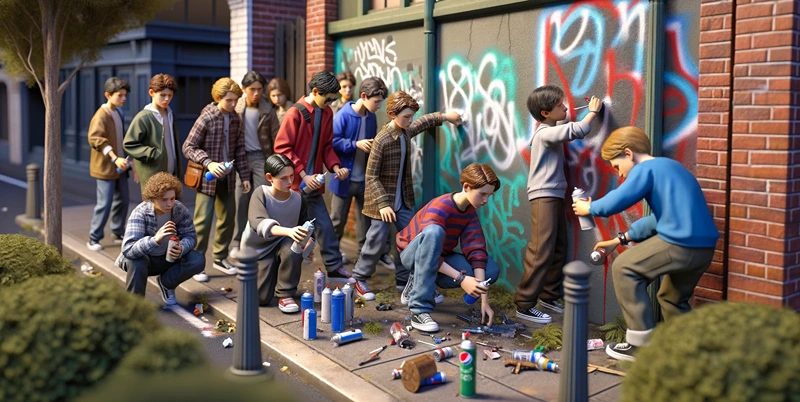
The Complete Guide to Juvenile Vandalism Defenses and Penalties Under Arizona Law
As a parent, guardian, or concerned citizen, you may wonder what actions are appropriate to protect or defend a juvenile charged with vandalism. Vandalism is a serious legal issue that comes with serious penalties, like juvenile detention, fines, and impact on the juvenile's future opportunities.
In Arizona, vandalism is a criminal act that involves knowingly and unlawfully defacing, damaging, or destroying public or private property without the owner's consent. This includes graffiti, scratching, marking, writing, drawing, painting, etching, cutting, carving, or destroying any part of the property. Juvenile vandalism is an offense if committed by a minor under 18 years old.
What is the Definition of Vandalism Under Arizona Law?
Under Arizona Revised Statutes § 13-1602, vandalism is defined as "criminal damage." It includes intentionally or recklessly defacing, damaging, or destroying any property, tampering with utility meters or pipes, as well as animal cruelty. Depending on the value of the damage, vandalism can be a felony, misdemeanor, or a petty offense.
Is Graffiti Considered Vandalism?
Yes, graffiti is considered vandalism. Graffiti involves writing, drawing, or inscribing words or images on surfaces, such as walls, buildings, street signs, vehicles, or any other property without the owner's permission. You can face charges for vandalism if you commit graffiti in Arizona. The penalties for graffiti include fines, community service, probation, restitution, and jail time.
Consequences of a Juvenile Vandalism Charge
If a juvenile engages in vandalism, the consequences range from mild to severe, such as:
- Community service
- Restitution
- Probation
- Fines
- Jail time
- Record of criminal activity
Moreover, the penalties may affect a juvenile's admission to college, employment opportunities, and eligibility for financial aid. The families and parents of their juvenile offenders may face legal consequences, financial burden, and stress. To avoid or minimize the damage, seeking legal assistance for juvenile vandalism cases may be necessary.
What If I Accidentally Vandalized Someone's Property?
If a juvenile accidentally damages someone's property, such as breaking a window with a ball, the juvenile may still face charges for vandalism. The owner of the property may file a complaint against the offender, and the case may go to court. In such cases, working with a criminal defense attorney who specializes in vandalism cases may help reduce or dismiss the charges.
How Does the Juvenile Court System Work?
The juvenile court system in Arizona operates differently from the adult criminal court system. In the juvenile court system, the main goal is to rehabilitate and educate juvenile offenders while taking into account their age, maturity level, and individual needs. Accordingly, the penalties for juveniles tend to be milder than those for adults.
If a juvenile is accused of vandalism, the court may hold a hearing to determine the juvenile's guilt and appropriate penalties. In some cases, the court may impose probation, community service, restitution, or counseling. If the juvenile violates any of these conditions, juvenile detention may be possible. The court also may order a civil penalty for the damage caused, which the owner of the property affected may seek in addition to other penalties.
Defense Strategies for Juvenile Vandalism Cases
Defending against juvenile vandalism charges requires an understanding of the laws and strategies for presenting a strong case. Some of the methods that criminal defense lawyers may use to fight vandalism charges include:
- Challenging the prosecution's evidence
- Proving the absence of criminal intent
- Arguing the charges as too severe for the crime
- Arguing that the property owners consented to the act
- Presenting evidence of the property's poor condition before the vandalism
- Plea bargaining or deferral options
Frequently Asked Questions
What Should I Do If My Child Is Charged with Vandalism?
The most critical step is to contact a criminal defense attorney who specializes in juvenile vandalism to evaluate the evidence and create a defense strategy on behalf of your child. It is essential to be present during all legal proceedings and follow the attorney's advice. Being proactive and cooperative during the process may reduce the penalties and secure better outcomes.
What Happens If a Juvenile Refuses to Pay Restitution?
If a juvenile refuses or fails to pay restitution, they may face several consequences, such as contempt of court charges, fees and interest on the balance, and a permanent criminal record, among others. It is critical to comply with the court's orders to avoid additional legal problems.
Can a Juvenile Vandalism Charge Affect a College Application?
Yes, a juvenile vandalism charge may affect a college application. Most schools require applicants to disclose criminal records and may conduct background checks. A criminal record does not automatically disqualify the applicant but may impact their chances of admission or receiving scholarships and financial aid. It is essential to seek legal assistance to mitigate the impact of a vandalism charge.
Can a Juvenile Vandalism Charge Result in Jail Time?
Yes, a juvenile vandalism charge can result in jail time, depending on the circumstances and severity of the damage. Juvenile detention facilities in Arizona are designed to protect and rehabilitate juvenile offenders, rather than punish them. Juvenile detention stays may range from a few hours to a few years depending on the case. A criminal defense attorney may help to reduce or avoid juvenile detention penalties.
Juvenile Vandalism Defenses and Penalties Under Arizona Law-Juvenile,Arizona

0 Comments